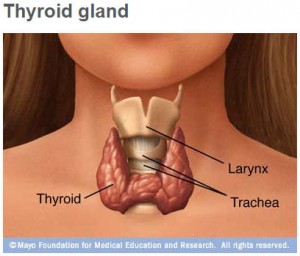-
Tuesday Q and A: Several treatment options decrease symptoms of Graves’ disease
 DEAR MAYO CLINIC: Three months ago I was diagnosed with Graves’ disease. I have decided to have a thyroidectomy and want to know what to expect after the procedure. Will all of my symptoms (Graves’ ophthalmopathy, heart palpitations, irritability) go away immediately after surgery? What are the side effects of having the thyroid removed?
DEAR MAYO CLINIC: Three months ago I was diagnosed with Graves’ disease. I have decided to have a thyroidectomy and want to know what to expect after the procedure. Will all of my symptoms (Graves’ ophthalmopathy, heart palpitations, irritability) go away immediately after surgery? What are the side effects of having the thyroid removed?
ANSWER: Thyroid removal is one of several treatment options that can effectively decrease symptoms of Graves’ disease. Others include anti-thyroid medications and radioiodine. Each person is different, and no one treatment is best for everyone. A thyroidectomy often relieves symptoms of Graves’ disease. But as with all surgery, there are risks and possible complications associated with thyroidectomy.
Graves’ disease is an immune system disorder that results in the overproduction of thyroid hormones, a condition known as hyperthyroidism. Because thyroid hormones affect many of your body’s functions, signs and symptoms of Graves’ disease can be wide ranging.
Medications that interfere with the thyroid’s use of iodine to produce hormones, known as anti-thyroid medications, may be helpful in controlling the disease. These prescription medications include propylthiouracil and methimazole.
More often, however, the disease is treated with radioactive iodine therapy, also called radioiodine. Because the thyroid needs iodine to produce hormones, the radioiodine goes into the thyroid cells. The radioactivity destroys the overactive thyroid cells over time. This causes your thyroid gland to shrink. Symptoms lessen gradually, usually over several weeks to several months.
Treating Graves’ disease with a thyroidectomy involves removing all or nearly all of the thyroid gland. The main side effect of not having a thyroid is the need for ongoing thyroid medication — usually one pill a day. Treatment with radioiodine also results in a need for life-long thyroid medication.
People with Graves’ disease who have ophthalmopathy — a condition characterized by bulging eyes, swollen or retracted eyelids, and eye redness — may chose surgery to remove the thyroid over radioiodine because the inflammation that causes those eye symptoms can get worse with radioiodine. Ophthalmopathy usually improves after surgery. But in some people, the symptoms may never go away completely. It can take several months to see the full effects of surgery on ophthalmopathy.
Typically, heart palpitations fade after thyroidectomy. It may take about a week for them to disappear. Irritability related to the Graves’ disease should improve after surgery as well.
Other reasons you may want a thyroidectomy or why it may be recommended as the best treatment include: a very large thyroid gland, suspicious thyroid nodules, failure or fear of radioiodine, or inability to take anti-thyroid medications. In addition, symptoms tend to go away faster with surgery than with other therapies.
Surgery also may be a good choice if you want to become pregnant in the near future, as some of the other treatments can increase the risk of birth defects.
Although they are small, there are risks associated with thyroidectomy. There could be permanent injury to the parathyroid glands. They are located next to the thyroid and regulate calcium. This type of injury would create a permanent need for calcium and vitamin D supplements.
The risk of injury during surgery to nerves that lead to the voice box is also very rare, but it could result in hoarseness, voice changes or swallowing problems. Severe nerve damage that requires a tracheostomy — a surgically created hole through the front of your neck and into your windpipe to provide an air passage to help you breathe — would be exceedingly rare. In most cases, nerve problems that happen as a result of thyroidectomy get better over time.
Not having a thyroid will not interfere with your day-to-day life as long as you are getting the right dose of thyroid medication. For most people, that is not difficult.
As you make a decision about thyroid surgery, thoroughly review with your doctor all the treatment options, along with their risks and benefits. This will help ensure you make the best choice for your situation. — Melanie Richards, M.D., Surgery, Mayo Clinic, Rochester, Minn.
Related Articles






